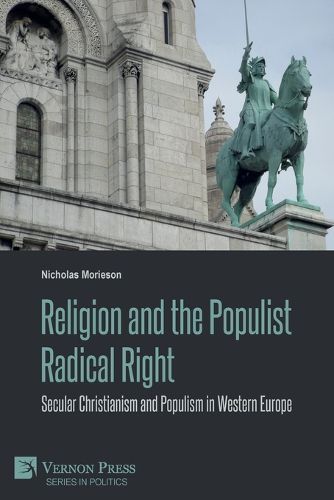Readings Newsletter
Become a Readings Member to make your shopping experience even easier.
Sign in or sign up for free!
You’re not far away from qualifying for FREE standard shipping within Australia
You’ve qualified for FREE standard shipping within Australia
The cart is loading…






This title is printed to order. This book may have been self-published. If so, we cannot guarantee the quality of the content. In the main most books will have gone through the editing process however some may not. We therefore suggest that you be aware of this before ordering this book. If in doubt check either the author or publisher’s details as we are unable to accept any returns unless they are faulty. Please contact us if you have any questions.
In Western Europe, populist radical right parties are calling for a return to Christian or Judeo-Christian values and identity. The growing electoral success of many of these parties may suggest that, after decades of secularisation, Western Europeans are returning to religion. Yet these parties do not tell their supporters to go to church, believe in God, or practise traditional Christian values. Instead, they claim that their respective national identities and cultures are the product of a Christian or Judeo-Christian tradition which either encompasses-or has produced-secular modernity.
This book poses the question: if Western European politics is secular, why has religious identity become a core element of populist radical right discourse? To answer this question, Morieson examines the discursive use of religion by two of the most powerful and influential populist radical right parties: The French National Front and the Dutch Party for Freedom. Based on this examination, he argues that the populist radical right has capitalised on a cultural shift engendered by the increasing visibility of Islam in Europe. Western Europeans’ encounter with Islam has revealed the non-universal nature of Western European secularism to Europeans, and demonstrated the secularisation of Christianity into Western European ‘culture.’ This, in turn, has allowed secular French and Dutch citizens to identify themselves-as well as their nation and, ultimately, Western civilisation-as Christian or Judeo-Christian.
Seizing on this cultural shift, the author contends that the National Front and Party for Freedom have built successful and similar brands of reactionary politics based on the notion that contemporary secularism is a product of Europe’s Christian heritage and values, and that therefore Muslim immigration is an existential threat to the core values of European politics, including the differentiation of politics and religion, and of church and state.
‘Religion and the Populist Radical Right: Secular Christianism and Populism in Western Europe’ will be of interest to scholars and researchers working on the intersections of Political Science, Sociology, and Religion. It will also appeal to the general audience interested in the relationship between populism in Western Europe and religious identity as it is written in an accessible style.
$9.00 standard shipping within Australia
FREE standard shipping within Australia for orders over $100.00
Express & International shipping calculated at checkout
This title is printed to order. This book may have been self-published. If so, we cannot guarantee the quality of the content. In the main most books will have gone through the editing process however some may not. We therefore suggest that you be aware of this before ordering this book. If in doubt check either the author or publisher’s details as we are unable to accept any returns unless they are faulty. Please contact us if you have any questions.
In Western Europe, populist radical right parties are calling for a return to Christian or Judeo-Christian values and identity. The growing electoral success of many of these parties may suggest that, after decades of secularisation, Western Europeans are returning to religion. Yet these parties do not tell their supporters to go to church, believe in God, or practise traditional Christian values. Instead, they claim that their respective national identities and cultures are the product of a Christian or Judeo-Christian tradition which either encompasses-or has produced-secular modernity.
This book poses the question: if Western European politics is secular, why has religious identity become a core element of populist radical right discourse? To answer this question, Morieson examines the discursive use of religion by two of the most powerful and influential populist radical right parties: The French National Front and the Dutch Party for Freedom. Based on this examination, he argues that the populist radical right has capitalised on a cultural shift engendered by the increasing visibility of Islam in Europe. Western Europeans’ encounter with Islam has revealed the non-universal nature of Western European secularism to Europeans, and demonstrated the secularisation of Christianity into Western European ‘culture.’ This, in turn, has allowed secular French and Dutch citizens to identify themselves-as well as their nation and, ultimately, Western civilisation-as Christian or Judeo-Christian.
Seizing on this cultural shift, the author contends that the National Front and Party for Freedom have built successful and similar brands of reactionary politics based on the notion that contemporary secularism is a product of Europe’s Christian heritage and values, and that therefore Muslim immigration is an existential threat to the core values of European politics, including the differentiation of politics and religion, and of church and state.
‘Religion and the Populist Radical Right: Secular Christianism and Populism in Western Europe’ will be of interest to scholars and researchers working on the intersections of Political Science, Sociology, and Religion. It will also appeal to the general audience interested in the relationship between populism in Western Europe and religious identity as it is written in an accessible style.